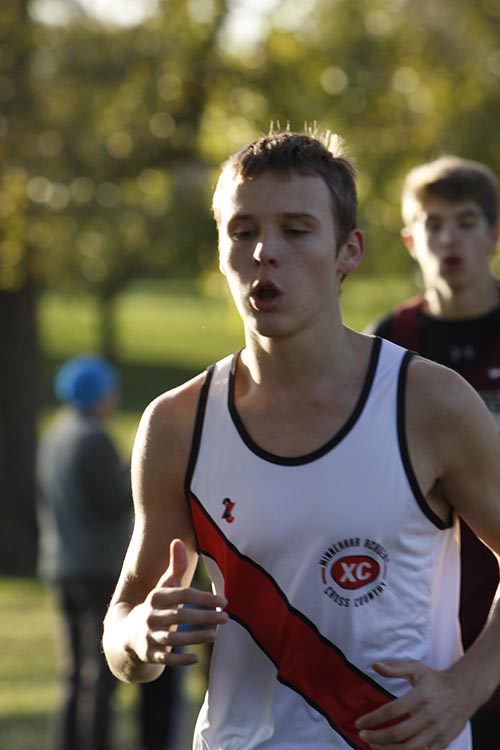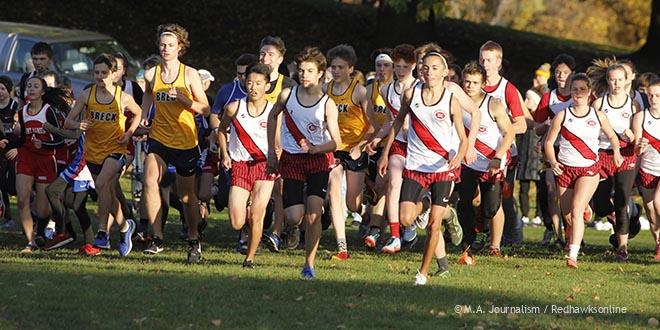A European perspective on the American combination of athletics and academics
In many cultures, sports are kept separate, in clubs. Are there any advantages to having school teams — or is it a distraction? Exchange student Karolina Cizmarova reflects on her experience as a student, an athlete and a fan.

Karolina Cizmarova competes in the mid-October cross-country section race at Highland Park Golf Course in St. Paul.
It is an early November night in Minnesota and one of the last football games of the season is underway. As spectators, our limbs are getting more and more numb by the second, the cold air made one awake by each inhale and the anxiety of what was next, made one’s eyes focused. Yet the warmth of laughter, excitement and connection with those around was what made the experience complete and “survivable.” Still, the best has yet to come when uncertainty is in the air and we know that we are helpless; all we can do is watch.
The game unfolds; there are two minutes left and one touchdown keeps us from winning the game. Everyone starts running towards one end, now we are body on body; that would never happen if we were in the hallways. You look around and see the emotions in people’s faces. Fifty, forty nine, forty eight. The clock is ticking and one’s heart starts beating faster. Then, all of a sudden, it happens. The Wolfpack team scores. Everyone starts clapping, jumping and screaming. This scenario might sound familiar to most high school and college students in the United States, however it is not the experience of students from other parts of the world.
Living all my life in Europe where sports are separated from school and coming to the United States where, in 2018 and 2019, a total of 7,937, 491 students were involved in a sport within the school, I started questioning the difference. Although I have never played a sport in my childhood years, yet I became part of the cross country team at Minnehaha Academy and was able to get a taste of both perspectives.
Both the United States and Europe have very successful athletes, despite the difference in having sports enrolled in school in the case of United States and having sports clubs outside of school in Europe. So what is the reason for having sports at school? In America, having the ability to play sports right after school, within the building with no added travel, makes it easier and more inviting for students to join athletics.

Patrik Pavlik also competed with the cross-country team this fall. Both Pavlik and Cizmarova attend C.S. Lewis School in Bratislava, Slovakia, and have been studying at Minnehaha Academy this semester.
“You are interacting with the same students that you do all day long, which establishes a comfort level,” said Josh Thurow, athletic director at Minnehaha Academy. “We all understand what Minnehaha Academy is all about academically and athletically, so we are on the same page here. And so that is more helpful than bringing all-star teams in from all over the place to make a club.”
From a student’s point of view, sports in high school and college are beneficial. They help students get through the school day, and it is also an incentive for them to do well in school; otherwise, they are not allowed to play sports.
Athletics make students prioritize their time and learn how to be more efficient in a shorter time span.
“Sports could consume a lot of time so one has to be good at time management, knowing when to do homework, when to study, but also when to take care of your body,” said senior football and basketball player Jalen Suggs.
What I was mostly concerned about was the difference among individuals. Does the competition help students work hard, or does seeing someone in a better position on the team make them forget their dreams and lower their self-esteem?
“It is healthy athletically to have a competition, however there is a place for every student on a team and that the higher skilled athletes are hopefully an inspiration, rather than a distraction,” said Thurow.
From my personal perspective, after I became a part of the cross country team, I have to say that athletics within the school plays an important role. I learned how to have control over my thoughts and decisions, and I was full of energy and enthusiasm. In the long-term, I built confidence within myself, learned how to be a part of a team and overall improved my physical and mental health.
During a cross country meet, there is nothing like standing in the circle with your teammates and praying together, hugging each other, screaming from the top of your lungs and clapping until you stop feeling your hands when you see them racing, doing karaoke while you are driving to races, but most of all, when you see them in the hallway and you know from the smile on their face that they would do anything for you to make you happy. In Slovakia could I do these things in my math class? For sure I could, but it wouldn’t be the same. There is a power in the events that brings a connection, which became important to each team member and so it did to me.

